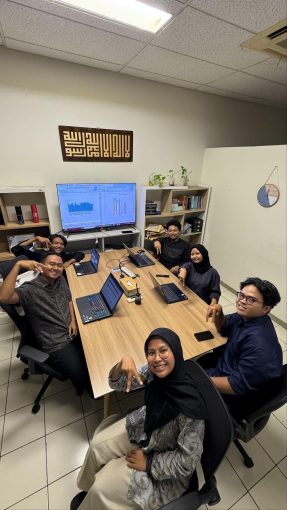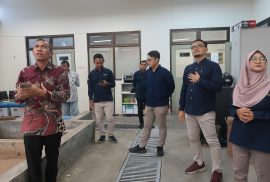
Optimization of Microgreens Production with Microalgae: Biometric Modeling and Fluorescence to Support Healthy Food in the Free Nutritious Meal (MBG) Program is an innovation by Universitas Gadjah Mada students focusing on improving nutrition through fast-harvest functional food. Starting from the challenges of limited agricultural land, the urgent need for readily available nutritious food, and support for the national Free Nutritious Meal program, the student team initiated research on the use of microalgae as biofertilizers to enhance the quality of microgreens.
The PKM-RE team consists of Les’Aullian Achmad Argito, Achmad Tijani, and M. Fajar Ridho Ilham from the Department of Agricultural and Biosystems Engineering, Faculty of Agricultural Technology UGM; Nisrina Rahma Ardihapsari from the Department of Biology, Faculty of Biology UGM; and Dina Eka Apriliawati from the Department of Plant Protection, Faculty of Agriculture UGM, with faculty advisor Ardan Wiratmoko, STP., M.Sc. This interdisciplinary collaboration demonstrates the synergy between agricultural engineering, biology, and plant protection in creating sustainable food solutions.
The foundation of this research lies in the utilization of microalgae (Spirulina sp., Chlorella sp., and Nannochloropsis sp.), which are rich in natural growth hormones, to improve photosynthesis, quality, and biomass of microgreens. This innovation is equipped with biometric modeling and chlorophyll fluorescence (Fv/Fm) analysis using a fluorometer and hyperspectral camera to monitor plant growth in real-time.
This innovation in optimizing microgreens production with microalgae also directly contributes to the achievement of the Sustainable Development Goals (SDGs). SDG 2 (Zero Hunger) is reflected in the provision of highly nutritious, easily produced functional food to support national food security. SDG 3 (Good Health and Well-Being) is realized through improved nutritional quality for school children via healthy microgreen-based foods enriched with microalgae biofertilizers. SDG 12 (Responsible Consumption and Production) is supported by the adoption of eco-friendly technology and resource efficiency in the fast-harvest food production process. Meanwhile, SDG 15 (Life on Land) is achieved through efforts to preserve terrestrial ecosystem sustainability by implementing innovative agricultural practices that minimize pressure on conventional farmland.
Looking ahead, this innovation is expected to support the Free Nutritious Meal program by providing functional food sources that are fast to produce, environmentally friendly, and nutritionally rich for school children. At the same time, it represents a tangible contribution from UGM students in strengthening national food security.




